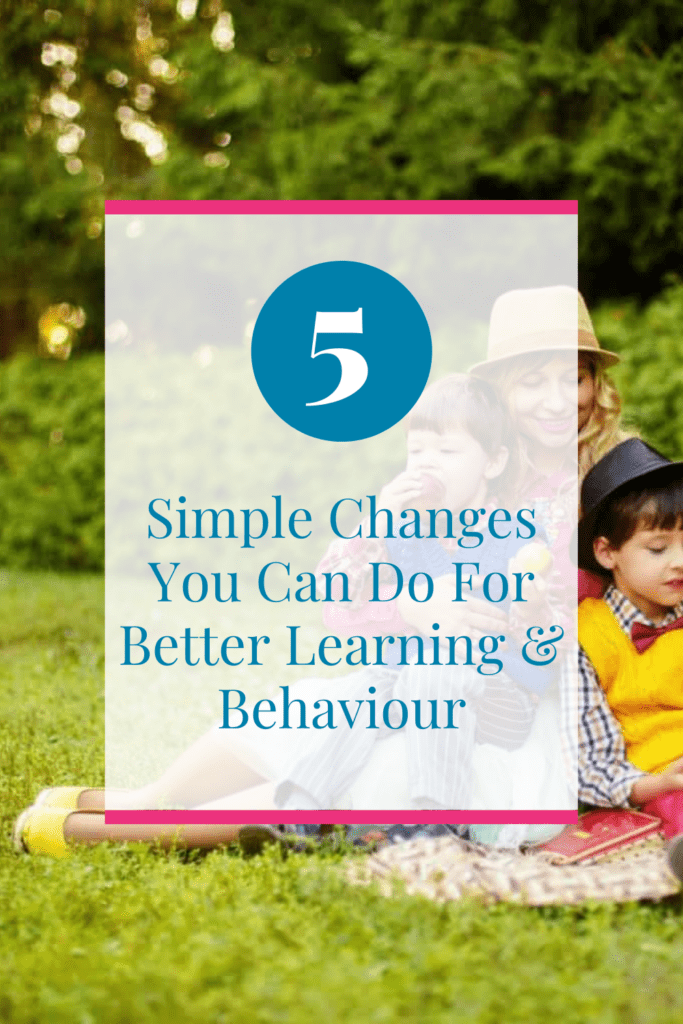Do you deserve an award for Google searching every article ever written on your child’s struggles? Congrats!
Feeling more overwhelmed than ever?
I know I was when I was looking for solutions for my daughter. It seemed the more I read, the more confused I was.
Knowing where to start is half the battle.
When parents come to see me for behaviour or learning struggles, it’s often for one of three reasons.
1. They hoped an official diagnosis and IEP would help their child overcome their learning struggles–and it didn’t.
2.They have tried medication thinking it would make all of their child’s problems go away–and didn’t help–or only kinda-sorta.
3.They don’t want to medicate their child–not until they have at least tried every other possible avenue.
Below are my top five starting points in helping a child begin the drug-free journey to building a better brain.
1) Just Eat Real Food (JERF)
Before even beginning to address individual food sensitivities, deficiencies, and overgrowth of bad gut bacteria, clients can often see moderate to significant improvements in adopting a diet free from chemicals, additives, food-colouring and preservatives.
Just Eat Real Food (JERF).
Homemade breakfasts like oatmeal or eggs, smoothies, and for lunch and dinner: soups, stews, salads, and casseroles, or meat and veggies.
In many instances, cutting sugar as much as possible (watch out for all that hidden sugar–it’s in everything) can tame tempers and increase focus and processing faster than miracle grow.
Take it slow–practice not perfection. These children respond well to high protein breakfasts and snacks. Search up paleo deserts to keep your kids happy and their sugar intake low.
2) Sleep
You know lack of sleep can make your kid downright impossible. I have found sleep to be almost as powerful as food. The minute I started getting serious about making sure my daughter gets 10 hours of sleep–her symptoms improved greatly.
Even 1-2 nights of late nights or poor sleep spells trouble. Kids today are chronically sleep deprived. We all need more sleep.
Insufficient sleep has been linked to hyperactivity, cognitive decline, poor memory, difficulty focusing and fluctuating mood. Sleep helps your brain to properly file memories and process the learning from the day. Children who get less than 8-10 hours of sleep a night tend to score significantly lower than their peers on tests.
One study even found that for every added hour of sleep a child gets—their grade levels also increase by up to one letter grade. Stay tuned for more tips on how to make end bed time battles.
3) Movement
Kids don’t move enough today and it’s affecting their brain development. Research found that children who exercise on a daily basis have more white matter in their brain which is responsible for attention and memory.
Exercise also doubles the size of the hippocampus in children which results in a more rapid growth of brain cells.
Occupational and educational therapists all agree that movement therapy is the number one way to illicit changes in the brain to improve focus and cognition. In the future, I will outline how specific movements can actually target certain areas of the brain to better develop.
4) Screen Time
You’ve heard it a dozen times and there is no need to go mom-guilting yourself. If your kids are getting too much screen time, avoid mutiny by reducing their time slowly. Excess screen time affects vision and eye coordination (think dyslexia), attention and focus, cognitive function as well as emotional processing.
Even moderate screen time has been shown to cause brain shrinkage of gray matter in the brain—where processing takes places. Dopamine, a crucial neurotransmitter involved in ADHD, is also impaired from screen time.
Dr. Victoria Dunckley’s research revealed that children develop a hyper aroused nervous system and lack restful sleep due to sensory overload. She explains “these children are impulsive, moody, and can’t pay attention.”
5) Supplements
While supplements can be helpful, there are far too many people trying to out supplement a bad diet. However, there are a few supplements that can have quite an impact on children with learning and behavior difficulties.
I don’t recommend just randomly supplementing (especially with minerals). However, nutrients and supplements that can help with focus, behaviour and learning are omega 3’s (essential fatty acids), zinc, iron, magnesium, B6 and B12.
Now let’s break this down even more simply. If I had to choose only 2 of the above 5 to start with, I would choose Just Eat Real Food as my #1. Next, I would choose sleep.
If you’re anything like I was when my daughter was at her worst, you’re burnt out and even this might seem overwhelming. That’s why I suggest starting with one action at a time. Weave in those changes.
And the first best action is food as it makes the biggest impact and you don’t have to be an expert to get started.
So go easy on yourself mama. Take small actions and keep putting one foot in front of the other.
If I could get there – so can you!
The goal of my programs The Full Potential Formula is not to focus on diagnoses but rather to address and improve the underlying glitches, dysfunctions and areas of underdevelopment so that kids can overcome their challenges.
To learn more about how you can help your child rise above learning and behaviour difficulties, schedule a free twenty-minute consult so I can help you identify the main reasons why your child is struggling with learning, reading and behaviour.


